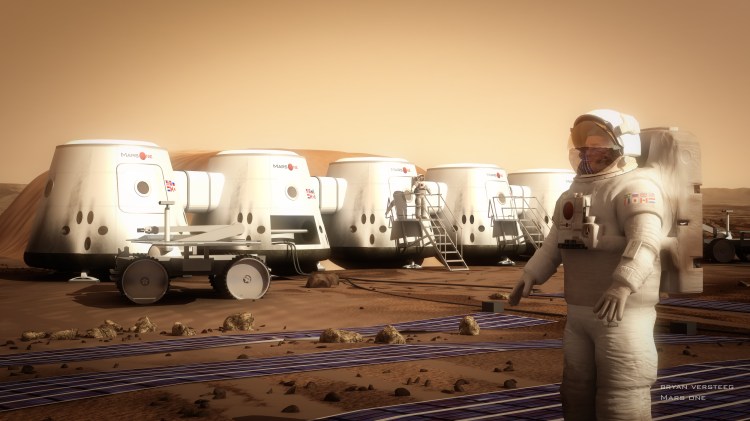Mars One is making progress toward its goal of sending humans to Mars — and leaving them there.
Mars One announced today that it has contracted Lockheed Martin and Surrey Satellite Technology Ltd. (SSTL) to develop mission concept studies for its first (albeit unmanned) mission to Mars. It also kicked off a crowdfunding campaign on Indiegogo to raise $400,000 to finance the studies.
Lockheed has participated in many of the NASA missions to Mars and will design a lander for Mars One based on NASA’s 2007 Phoenix mission spacecraft. The goal is for it to land by 2018.
“A human mission to Mars will always be risky,” Lansdorp said. “The risk will be reduced to acceptable levels by employing proven technology available from the best aerospace companies, which has been tested for many years here on Earth.”
The lander will scoop up Martian soil with a robotic arm, extract water from the soil, and conduct a power experiment with solar panels. A camera on the lander will make continuous video recordings, which will be relayed back to Earth.
If successful, this will be the world’s first private mission to the red planet. It also an important stepping stone towards Mars One’s ultimate goal of setting up a human colony
VentureBeat has followed Mars One and its fascinating tale for a while now. Founder Bas Landsdorp said that the technology to achieve Mars One’s mission is possible, the challenge is getting the financial support required. And finding people willing to leave Earth forever.
“There is no way to go back — going to Mars is a decision that you make for the rest of your life,” Lansdorp said. “The technology for a return mission does not exist. Even if a return mission were available, it would be uneconomical, dangerous and unnecessary. There are true pioneers among us today who have the sense of purpose to lead the way in expanding human presence in the galaxy.”
Mars One is a nonprofit, so it doesn’t have the benefit of the government’s resources or a commercial revenue stream, like SpaceX. The organization raised an angel round of funding and will ultimately explore sponsorships, broadcasting rights (for when the mission lands), and advertising as a way to raise the projected $6 billion required.
That number makes $400,000 from Indiegogo seem like a drop in the bucket, but every little bit counts and will go toward an immediate goal. Like many crowdfunding campaigns, a big part of the objective is to generate buzz and awareness for a project.
The human mission is expected to depart in 2024. From then on, four people will go every two years to expand and nurture the colony. The settlers will spend their time exploring the Martian surface, doing experiments, construction work, and farming. They will also have to operate and monitor all the systems and communicate with mission control.
“The settlers will not carry the water and oxygen they will need on Mars,” Lansdorp said. “Water can be extracted from the ice in Martian soil, which will be fed to the life support system to make drinking water and oxygen (produced from electrolysis of extracted water) available inside the habitat. The life support system will also extract nitrogen existing in the Martian atmosphere to make breathable air available inside the habitat.”
2013 was really the year that commercial space exploration took off, with exciting developments coming from SpaceX and Virgin Galactic. Mars One is a more idealistic endeavor — it wants to set up a colony as a sort of “let’s see what happens” experiment
The project began in January and has made some slow but steady progress towards its goal. It teamed up with the Paragon Space Development Corporation in March to develop life support systems and space suits, and signed on a university partner.
Then Mars One opened up applications for the mission in April, and more than 78,000 people signed up from 120 countries in two weeks. That is a shocking number of people eager for a one-way ticket to a dusty, desolate, oxygen-poor environment.
In an interview with Jolie O’Dell earlier this year, Lansdorp said the main criteria Mars One is looking for in colonists is the ability to work well in a group.
“Our medical director ensured me that the difficult part is living on a new planet with a small group of people in a dangerous environment and staying friends,” Lansdorp said “It’s the most dangerous part. … So we’re not looking for engineers and pilots. We’re looking for people who have this inherent quality, being the kind of person you want to be stranded with. We can teach them any skill they need to have. Basically, what they need to do is survive. Anything that breaks, a machine or a person, it needs to be fixed. That’s the most important thing they need to learn.”
While Lansdorp, the Mars One team, and his aspiring astronauts are bullish about the mission, not everyone shares the optimism. NASA chief Brian Muirhead told Black Hat conference attendees in August that a commercial mission to Mars is “beyond our capability.”
It is an ambitious and crazy idea to be sure, but then again most of the good ones are.


